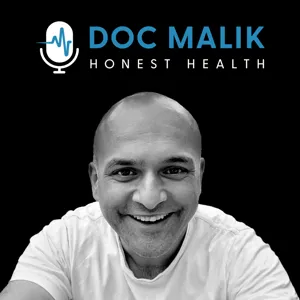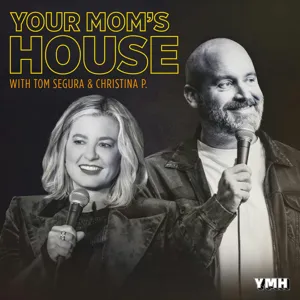Podcast Summary
Childhood experiences on a farm can shape future dreams: Growing up with freedom and opportunities to explore dreams on a farm can lead to returning and saving it, as seen in Forrest Prichard's journey
Having a childhood filled with freedom and opportunities to explore your dreams, even while growing up on a farm, can greatly impact your future. Forrest Prichard, the owner of Smith Meadows Farm, shares his story of how his childhood experiences on the seventh-generation family farm allowed him to dream beyond the farm and eventually become a farmer himself. Despite his initial dreams of becoming a superhero, he grew up with the freedom to have a childhood and later returned to the farm to save it from being sold. His book, "Gaining Ground," details his journey and the importance of following your dreams while also appreciating the opportunities and experiences that come from your past.
Childhood experiences shaped speaker's passion for farming: Speaker's emotional connection to the land drove them to become a farmer, despite financial challenges, highlighting the importance of recognizing the land's significance beyond just economic value.
The speaker's fond memories of childhood experiences on farms and a growing concern for the loss of agricultural land led them to pursue a career in farming. The speaker felt a strong sense of stewardship and connection to the land, which was amplified by the rapid development and loss of farms during their formative years. This resonance with the land and the desire to preserve it influenced their decision to become a farmer, despite the financial challenges and risks associated with the profession. The speaker's personal experiences highlight the importance of recognizing the emotional and cultural significance of the land and the potential consequences of its loss.
Alternative to Conventional Agriculture: Sustainable farming focuses on self-sufficient methods, using organic methods, local marketing, and reinvesting in the local community, offering an alternative to conventional agriculture with potential environmental and economic benefits.
Sustainable farming offers an alternative to conventional agriculture by focusing on self-sufficient methods that are not only good for the environment but also economically viable. The speaker, who grew up on a struggling farm and later became interested in geology and sustainable farming, emphasizes the importance of sustainable farming practices such as using organic methods, local marketing, and reinvesting in the local community. He contrasts sustainable farming with conventional agriculture, which relies heavily on chemicals, confinement, and long-distance transportation, and often results in low profits for farmers. The speaker emphasizes that he's not trying to persuade people to eat organic or conventional food, but rather to offer an alternative and raise awareness about the potential benefits of sustainable farming.
Sustainability in farming goes beyond raising livestock, it's about raising grass and utilizing natural resources: Consider the root of sustainability when making food choices, grass-fed animals and production models are more sustainable than grain-fed models, unsanitary and unnatural farming practices have negative impacts on animal welfare and human health
Sustainability in farming goes beyond just raising livestock. It's about raising grass and utilizing natural resources like sunshine, rain, and soil fertility to create a self-sustaining system. Grass-fed animals and grass-fed production models are more sustainable compared to grain-fed models. The contrast is stark, and consumers should consider the root of sustainability when making food choices. The smell of unsustainable farming practices, such as confinement feeding operations, is a clear sign that something is not right. Our senses, especially our sense of smell, have been evolved to recoil from bad smells as a warning sign. The unsanitary conditions and unnatural diets of animals in confinement farming are not sustainable and can have negative impacts on both animal welfare and human health.
Impact of Industrial Farming on Animal Welfare and Human Health: Industrial farming systems negatively affect animals and humans through the use of antibiotics and unsustainable feeding practices. A more sustainable approach allows animals to express natural behaviors and eat diverse diets, benefiting both animals and consumers.
The way animals are raised and fed in industrial farming systems, particularly with grain-fed animals, can have negative consequences on both the animals and consumers. This can lead to the need for more antibiotics and potentially impact human health. A more sustainable approach involves allowing animals to express their natural behaviors and eat a diverse diet that includes minerals from the soil. This not only benefits the animals but also produces more flavorful meat and creates a sustainable farming story for consumers. While grass-fed cattle and sheep are the most sustainable animals on the farm due to their herbivorous diet, pigs and chickens, as omnivores, still benefit from some grains as part of their diet. Overall, the goal is to find a balance where animals can express their natural behaviors and farmers can raise them sensibly for the benefit of all involved.
The Challenges of Sustainable Farming: Sustainable farming reduces the need for chemical fertilizers and fuel for tractors, offers a more humane way to treat animals, and encourages a circular economy, but it can face initial obstacles such as negative peer pressure and financial difficulties.
Sustainable farming is an economical and humane way to produce food, but it comes with challenges. The speaker faced negative peer pressure and the widening gap between commodity prices and the cost of living, which made it difficult for him to start farming sustainably. However, he saw the beauty in the circle of life, where manure from livestock fertilizes the grass for the cattle, reducing the need for chemical fertilizers and fuel for tractors. Sustainable farming also offers a more humane way to treat animals, and the manure's cleanup is minimal. Despite the initial obstacles, the speaker saw the value in sustainable farming and encourages others to consider it as well.
Overcoming challenges in farming through determination and belief: Belief in a vision and determination can help farmers overcome financial struggles and skepticism, leading to success through diversification and sustainable practices.
Starting and sustaining a farm, especially during challenging economic times, requires a deep commitment and belief in something bigger than oneself. The speaker faced numerous challenges, including financial struggles and skepticism from the farming community, but was kept going by the support of his parents and a strong belief in his vision. Despite initial setbacks, the speaker persevered and eventually found success through diversification and a focus on sustainable, grass-fed farming practices. The journey was not easy, but the speaker's unwavering faith and determination paid off in the end. Farming, like writing, may not be lucrative careers in the traditional sense, but for those with a passion and a commitment to something greater, the rewards can be profound.
The importance of customer trust and shared values in sustainable farming: Support local and transparent farming operations to ensure ethical and eco-friendly practices continue in the industry
The success of a business, especially in the farming industry, heavily relies on the belief and support of customers. The farmer in this discussion attributes much of his success to his customers' shared values and their trust in his humane and organic farming practices. A typical day on the farm is filled with variability and hard work, from attending farmers markets to caring for livestock and fixing equipment. To support sustainable farming, listeners can make a conscious effort to purchase from local and transparent farming operations, ensuring the continuation of ethical and eco-friendly practices in the industry.
Connecting with local farmers: Support local farmers through markets, CSA programs, or buying clubs. Debt-free farming is key to long-term success.
Building a connection with your local farmers is essential for understanding where your food comes from and supporting sustainable agriculture. This can be achieved through various means such as farmers markets, CSA programs, or buying clubs. The growth of farmers markets in the past decade is a testament to the increasing demand for locally sourced, family-run farms. For those considering a career in farming, the top advice would be to avoid debt and embrace the long-term commitment that comes with growing food. This mindset is the antithesis of the shortcut culture we live in, but the rewards of sustainable farming are worth the investment. By getting to know your farmers and supporting their businesses, we can create a healthier and more resilient food system.
Farming: Unpredictable and Risky: Expect and accept failure, stay out of debt, grow slowly, be a farmer to keep the farm running, and leave a legacy for future generations.
Farming, like life, is unpredictable and comes with risks. The speaker shares his experience of financing a house through a farm loan, only to face financial troubles during economic downturns. He emphasizes the importance of expecting and accepting failure, staying out of debt, and growing slowly. The 15-year journey of saving the family farm and becoming a sustainable farmer made him realize the importance of being a farmer to keep the farm running and the significance of passing it down to future generations as a legacy. The speaker's priorities shifted, and the arrival of his eight-year-old son added a new dimension to sustainability and the importance of leaving a legacy for his family.
Farmers' values: dedication, selflessness, and faith: Applying farmers' values of dedication, selflessness, and faith can lead to personal growth and fulfillment in any man's life.
The values and work ethic of a farmer, such as dedication, selflessness, and faith, can be applied to any man's life to help him become a better person. These values are deeply ingrained in our culture, even if we are no longer directly involved in farming. By waking up every day and committing to putting in the hard work, no matter the circumstances, we can make a positive impact on ourselves and those around us. The farmer's lifestyle may not offer material rewards, but the personal growth and fulfillment gained from living a life of commitment and perseverance are priceless.













